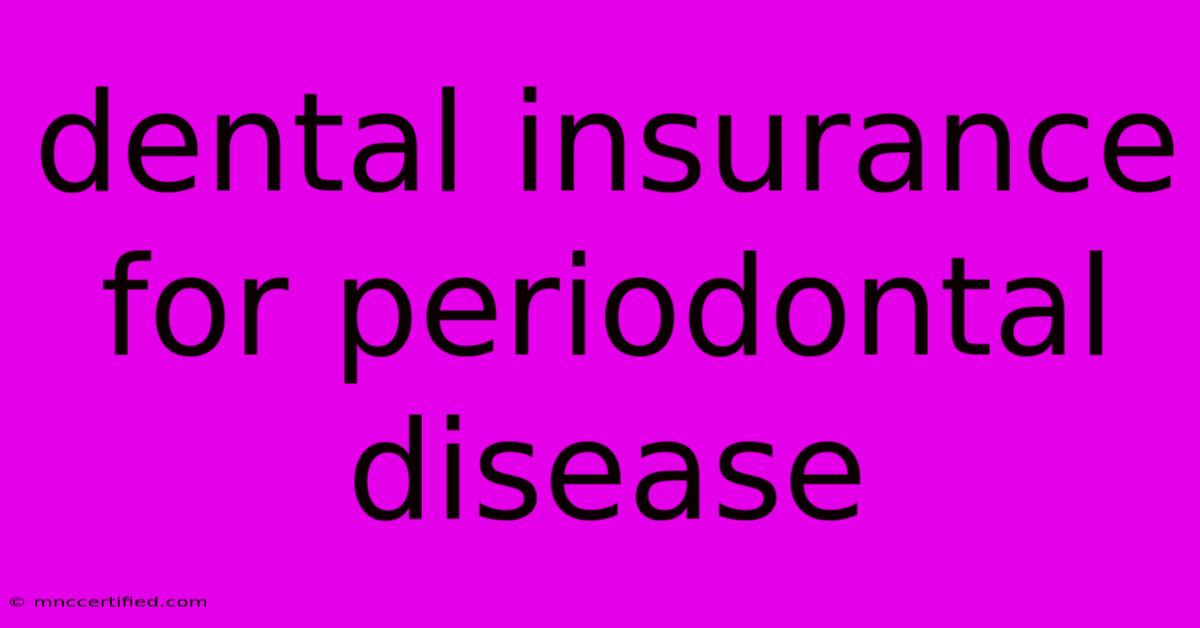Dental Insurance For Periodontal Disease

Table of Contents
Navigating Dental Insurance for Periodontal Disease: What You Need to Know
Periodontal disease, also known as gum disease, is a common and serious condition that affects the gums and bones supporting your teeth. It can lead to tooth loss if left untreated. If you're struggling with periodontal disease, you might wonder how your dental insurance plan covers the treatment. This guide will provide you with essential information about dental insurance and periodontal disease.
Understanding Dental Insurance Coverage
Dental insurance plans differ in coverage, so it's crucial to review your specific policy. Generally, dental plans fall into three categories:
- Preventive: This includes routine checkups, cleanings, and X-rays.
- Basic: This covers fillings, extractions, and simple procedures.
- Major: This covers more complex procedures like crowns, bridges, and implants.
Periodontal disease treatment typically falls under the "major" category, which means your coverage might be limited compared to preventive or basic services.
What Does Dental Insurance Cover for Periodontal Disease?
Here's a breakdown of common procedures and their coverage:
- Cleanings: Most plans cover regular cleanings, but deep cleanings (scaling and root planing) for periodontal disease might have limited coverage or require a higher co-pay.
- Gum Surgery: This can be expensive, and insurance coverage varies widely. Some plans might only cover a portion of the cost, while others may require pre-authorization for specific procedures.
- Bone Grafts: These procedures are complex and often have limited coverage. You might be responsible for a significant portion of the cost.
- Antibiotics: Coverage for antibiotic medications can vary depending on your plan.
Tips for Maximizing Your Coverage
- Review Your Policy: Familiarize yourself with the specifics of your dental insurance plan, including coverage limits, annual maximums, waiting periods, and pre-authorization requirements.
- Schedule Regular Cleanings: Preventative care is crucial for maintaining oral health and can help minimize the risk of developing periodontal disease.
- Ask About Pre-Authorizations: For more complex procedures like gum surgery, inquire about pre-authorization requirements to ensure coverage.
- Consider a Dental Savings Account (DSA): A DSA allows you to set aside pre-tax money to pay for dental expenses, which can help reduce the out-of-pocket costs for periodontal treatment.
- Negotiate Payment Plans: If your dental plan doesn't cover the full cost, explore payment options with your dentist, like installment plans or financing options.
Beyond Insurance: Additional Considerations
- Early Detection: The earlier you detect periodontal disease, the easier it is to treat. Regular dental checkups are essential.
- Lifestyle Changes: Healthy habits like a balanced diet, smoking cessation, and proper oral hygiene can play a significant role in preventing and managing periodontal disease.
Remember: This information is for general guidance only. Contact your dental insurance provider for specific details regarding your coverage and benefits. By understanding your plan and proactively managing your oral health, you can effectively navigate dental insurance for periodontal disease and maintain a healthy smile.

Thank you for visiting our website wich cover about Dental Insurance For Periodontal Disease. We hope the information provided has been useful to you. Feel free to contact us if you have any questions or need further assistance. See you next time and dont miss to bookmark.
Featured Posts
-
Pressure Mounts For Early German Vote
Nov 08, 2024
-
Car Insurance In Spain For Non Residents
Nov 08, 2024
-
German Chancellor Faces No Confidence Call
Nov 08, 2024
-
Bank Of England Rate Cut Lower Mortgages
Nov 08, 2024
-
Second Home Vs Rental Property Insurance
Nov 08, 2024